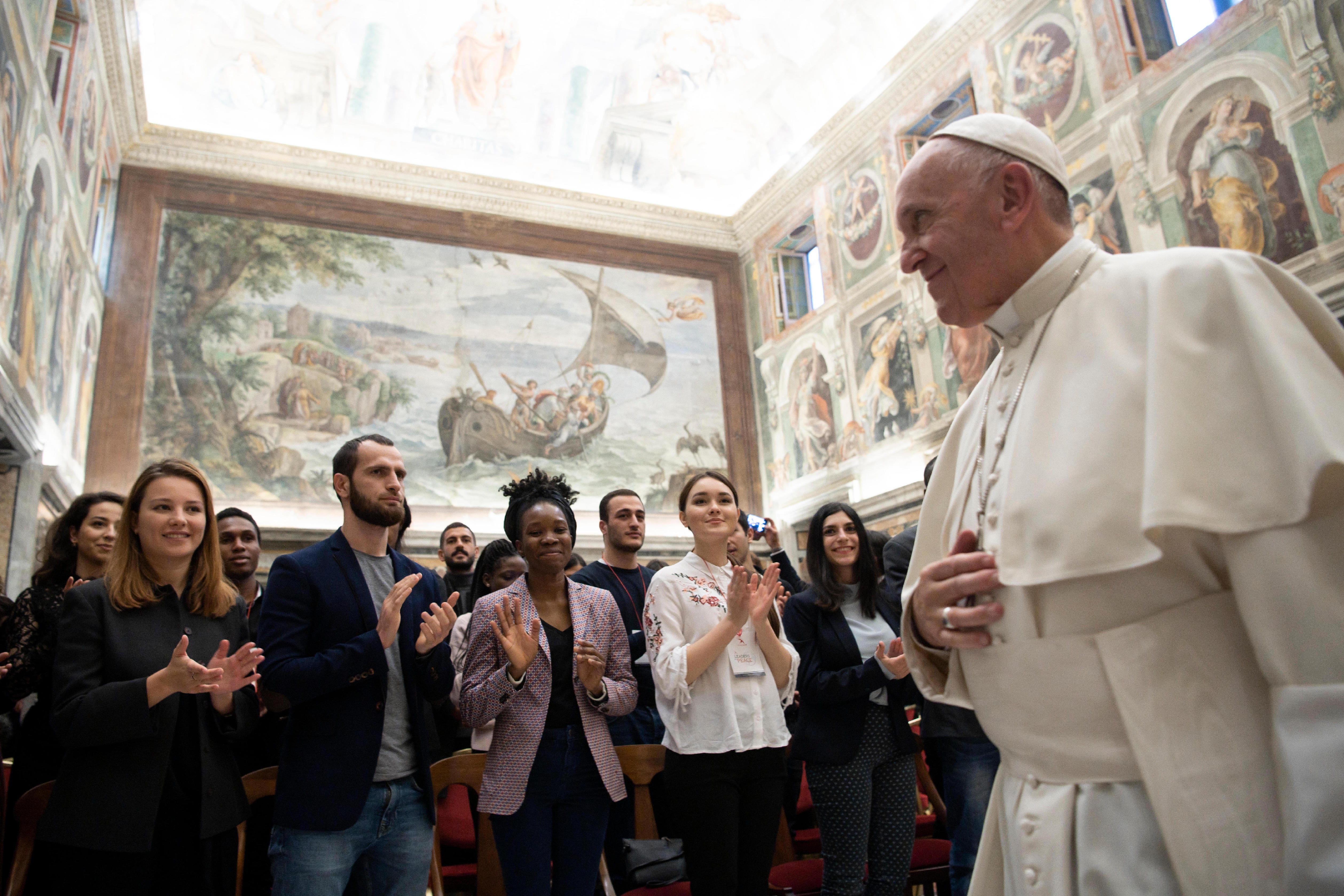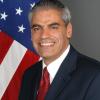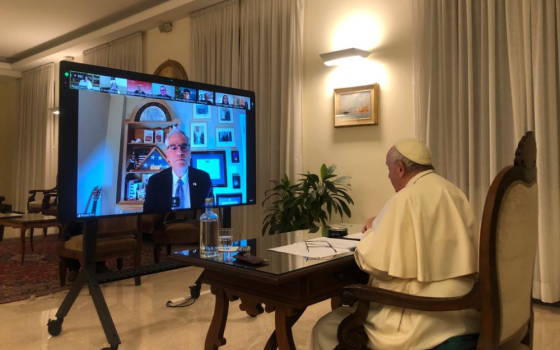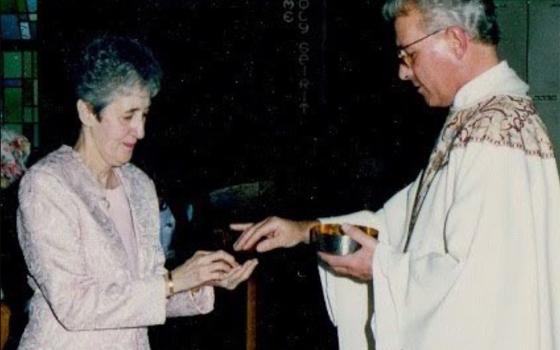
The Rondine students met with Pope Francis before they left for the United Nations. Rondine is a small village in Tuscany that for over 20 years has hosted young men and women from conflict and war zones around the world. (Courtesy of the Rondine Cittadella della Pace press office)
This past December I accompanied a group of international students from an organization called Rondine Citaddella della Pace to the United Nations in New York. Rondine is a little Italian village nestled in the heart of Tuscany that for over 20 years has hosted young men and women from war zone and conflict areas around the world. These energetic ambassadors for peace went to the United Nations to commemorate the 70th anniversary of the Universal Declaration of Human Rights and to launch a new global effort entitled the Leaders for Peace initiative. This initiative seeks support from the 193 member nations of the U.N., asking world leaders to set aside just a fraction of their defense budgets to support the youth of Rondine in their desire to build bridges of understanding, overcome human differences and foster youth-led popular diplomacy. Central to this diplomatic initiative is the invitation to face our neighbors through embodied accompaniment and reconcile ourselves with those we have socially constructed as our "enemies."
I first became acquainted with Rondine through my official diplomatic role as U.S. ambassador to the Holy See. On the occasion of the 10th anniversary of 9/11 and in remembrance of the lives lost on that day, I invited these young men and women to come to Rome to share their memories of this tragic event and to offer their transformative visions for a more humane future. I still vividly recall the lively conversations that ensued with members of the diplomatic corps accredited to the Holy See. Over the years, I have remained in touch with the group and regularly travel to Italy to contribute to their bridge-building efforts, especially with respect to helping Rondine students explore the valuable contribution that religious leaders and religious traditions can offer to the work of human reconciliation. I often share with the youth of Rondine practices of hospitality that emerge from religious traditions and some that are rooted in biblical texts.
A famous fifteenth century Russian icon of the Trinity depicts the hospitality that the biblical figures of Abraham and Sarah offer to three migrating strangers that come to their home (Genesis 18). The iconographer, Andrei Rublev, artistically links this story of hospitality to the central Christian teaching that affirms the Triune mystery of God in his icon. God, conceived within Christian traditions, is a God of extravagant hospitality, a God who migratesfromand forthe sake of love, offering life where life has come under threat. Rublev captures this theme of hospitality by depicting three distinctive angels "facing" one another in an open circle, reclining at a common table and sharing life-sustaining resources. In Christian tradition, these angels represent the three divine persons (Father, Son and Holy Spirit), and the orientation each person has toward the other suggests the Christian teaching that no one person, whether we think of divine or human persons, can exist alone as an island. The icon serves as a powerful reminder that we were created as one human family to exist in communal relations that affirm human differences. Through right relationship and encounter with others, we express and realize ourselves as God's children, as icons of the God of life.

"The Trinity" by Andrei Rublev (Wikimedia Commons)
The story of the hospitality offered by Abraham and Sarah teaches us something important about the ethical values of daily accompaniment, interdependence and overcoming the fear of strangers. The story invites us to consider that the persons we wall off from our circle of relations, demonize and consider enemies might hold the key for our humanization. Capturing a central biblical motif — the reversal of the host-guest relationship — the story of the hospitality of Abraham and Sarah speaks to what happens when we open our homes to receive our estranged neighbors. The youth of Rondine learn this lesson well because the project intentionally chooses and welcomes estranged youth into a common home in order to discover the humanity of those characterized as the "enemy"— those we have declared "strangers" "aliens," "illegals, "dangerous" and "foreigners" in our own lands.
In his book The Dignity of Difference, Rabbi Jonathan Sacks argues that "Nowhere is the singularity of ethics more evident than in its treatment of the issue that has proved to be most difficult in the history of human interaction, namely the problem of the stranger, the one who is not like us." Sacks notes that "the Hebrew Bible in one verse commands, 'You shall love your neighbour as yourself' but in no fewer than 36 places commands us to 'love the stranger.' " In the New Testament, Jesus continues to teach and practice this central biblical motif. Above all, Jesus invites us to see God in the face of all our neighbors, and preferentially in those who suffer from various forms of personal and social illness (Matthew 25). As a faithful Jew, Jesus' words and actions capture what Sacks rightly underscores is a central teaching of the Hebrew Scriptures, namely, "to make space for difference."
Within and outside of our borders, we have witnessed what happens when we fail to make space for difference. Consider a culture that precipitates the violence inflicted on faith-filled communities of Sikh Temple of Wisconsin; Mother Emanuel African Methodist Episcopal Church in South Carolina; Dar Al-Farooq Islamic Center in Minnesota; First Baptist Church of Sutherland Springs in Texas; and Tree of Life Congregation in a Pennsylvania synagogue. Consider the recent terrorist attacks in New Zealand that killed 50 Muslims in two mosques. We also fail to make room for difference when fellow Americans and our leaders dehumanize and ridicule desperate children and families seeking to cross our southern border in search of life. And we fail to make room for difference when we do not protect the bio-diversity of our planet and insure the survival of our Common Home for the sake of future generations.
Advertisement
At this time of growing threats, inhospitality and violence, Rondine's youth-led Leaders for Peace initiative models a rejection of what Pope Francis has called the "globalization of indifference" and offers instead an option to make room for difference. As Pope Francis underscored in his message to Rondine at the Vatican before their voyage to the U.N., "only through dialogue can trust be created," a dialogue rooted in the encounters of daily living. Indeed, what makes Rondine's peace-building efforts a recipe for success in local and international relations is their invitation to embrace convivenza, an intentional commitment to a culture of encounter lived daily by coming together with others and their distinct differences for the sake of building the common good. These young ambassadors have much to teach us about tearing down ideological "walls" that divide and polarize us.
A group photo of the students from Rondine during the launch of their initiative at the United Nations building in New York. (Courtesy of the Rondine Cittadella della Pace press office)
Every time I go to Rondine I look forward to teaching the young women and men how the stories and wisdom of our many religious traditions can contribute to building peace. But I always leave Rondine having learned much more from the personal stories and the embodied witness of these young men and women who choose to create safe spaces where strangers are no more and where humanity can be welcomed in its great diversity. Embracing their practice of hospitality — a personal and daily commitment to inclusive and just accompaniment — offers a hope that it is possible to overcome poisonous discourse and violent actions that divide our human family. Are we, in the ordinariness of our lives and in the spaces we exercise leadership, willing to listen to these young ambassadors and learn how to discover our own humanity in the faces of our estranged neighbors?
[Miguel H. Díaz is the John Courtney Murray University Chair in Public Service at Loyola University in Chicago. He was ambassador to the Holy See during the first administration of President Barack Obama.]
Editor's note: We can send you an email alert every time a Theology en la Plaza column is posted to NCRonline.org. Go to this page and follow directions: Email alert sign-up.







